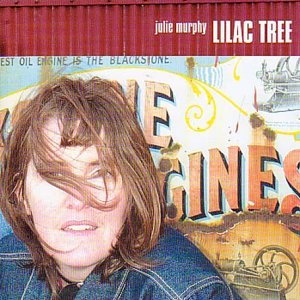 Julie Murphy has produced a singular CD that rises above the folk singer-songwriter genre to make an intimate artistic statement. Best known for her interpretations of traditional material, including Welsh folksongs, the North London-born Murphy has worked with such diverse collaborators as hurdy-gurdy player Nigel Eaton, the Afro-Celt Sound System and Robert Plant. On Lilac Tree Murphy has teamed up with guitarist Richard Llewellyn on nine original songs and one trad number.
Julie Murphy has produced a singular CD that rises above the folk singer-songwriter genre to make an intimate artistic statement. Best known for her interpretations of traditional material, including Welsh folksongs, the North London-born Murphy has worked with such diverse collaborators as hurdy-gurdy player Nigel Eaton, the Afro-Celt Sound System and Robert Plant. On Lilac Tree Murphy has teamed up with guitarist Richard Llewellyn on nine original songs and one trad number.
Playing with Murphy and Llewellyn are bassist-pianist Tim Harries, Welsh drummer Rowan Griffiths and trumpeter Tomos Williams. It’s an inspired collaboration, and the material is more than a match for the quality of the players. The songs were recorded live in the studio, giving the whole project a spontaneous feel, and the production is open, clear and balanced.
The CD opens with the passionate and sexy “Kiss Like That,” a jazzy number in a spare instrumental setting of acoustic guitar, double bass and brushed cymbals, with fluttering fills from Williams’ muted trumpet. Murphy sings in a lightly quavering mid-range voice that sounds a bit like Linda Thompson’s when Murphy drops into her lower range, and is colored by her charming English-Welsh accent.
The rest of the record tends toward slow and mid-tempo ballads lke “My Father Was,” which sounds like a traditional song, “Leave Him” and “My Church,” a disparate pair of introspective love songs, and the wistful “Night Visit.” The sole trad number, the anti-war ballad “Fighting for Strangers,” is also in this vein.
Lilac Tree is leavened with a few slightly uptempo numbers like the title track, a catchy ditty based on a children’s rope-jumping song: “Jumping, jumping, 1-2-3/underneath the lilac tree/when the tree came down/all my dreams came tumbling down.” “Train (Going West)” has a railroad-shuffle beat, although the tune is mostly longer notes, which sets up a pleasing tension with the rhythm.
Murphy’s full force comes out in the final track, “Cilgerran (Glory of Love),” which combines a kind of Lucinda-Williams-in-Wales sparse poetic lyrics, set against Llewellyn’s fingerpicking that imitates the droning and skirling of pipes. It’s the only song with a chorus of backing voices, which accentuate the nearly chanted refrain, “I am born again, sweet summer rain/glory of love, freedom from pain.”
Lilac Tree offers Julie Murphy’s unique but not gimmicky version of introspective folk music, one well worth spending some time with. You can learn a lot more about it at her website [].
(Beautiful Jo, 2002)
